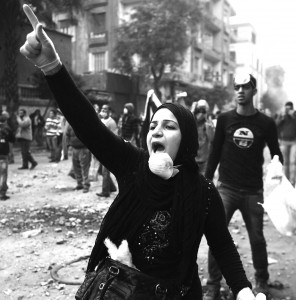 As headlines roll with stories of ‘deadly clashes between protestors and the military’ on the 26th of February, 9th of March, 9th of April, 28th of June, 1st of August, 9th of September, 9th of October, 19th of November and 16th of December; one wonders if anything is happening in Egypt beyond the shooting and continuous arrests.
As headlines roll with stories of ‘deadly clashes between protestors and the military’ on the 26th of February, 9th of March, 9th of April, 28th of June, 1st of August, 9th of September, 9th of October, 19th of November and 16th of December; one wonders if anything is happening in Egypt beyond the shooting and continuous arrests.
The truth is that escalating violence is a reaction to the growing realisation that the Egyptian people are gaining ground and the ruling military junta are unable to stop them. The movement’s base is made up of battles being fought every day well beyond the centre we’ve known as Tahrir, or the capital, Cairo.
It may not make the news that the people of Damietta, a northern port city, had been protesting the expansion of a toxic plant for months leading up to November. When they were made to sound like rioters by the media, they made posters reading “Stop polluting our Skies”. It makes the news that a pipe-line delivering natural gas to Israel has been bombed 10 times this year by a ‘terrorist’. But you may not have heard that the ‘mulatham’ (masked ranger) wrote “Stop selling our gas cheap to Israel” – in fire, on the desert sands.
You may also not have heard of the university professor who walked into his class in the small delta town of Mansoura, scribbled “Down with military rule” on the blackboard, and walked out. This was the 17th of December, a day into the latest
deadly clashes. He taught his students a lesson they’d never forget; that university is a place for politics; that without freedom, education amounts to very little. Three days later, the students of Ain Shams, one of Cairo’s biggest universities, announced a strike, and the university’s president led a march protesting military rule.
This revolution, however cannot be limited to the stride towards emancipation nor the struggle towards democracy that ‘Arabs never had’, because we, like you, are pushing for a system that serves us.
On the first day of the Occupy LSX sit-in, Julian Assange paid us a visit. He reminded us that “We are all being held hostage to the rule of law…” when in fact we should be concerned with creating a rule of law; a law that serves us, and doesn’t restrict us. Laws that ensure the resources and bounties of our nations benefit us as citizens.
That is, after all, what we hire governments for. In that light, our plight is no different than yours. It is to change a local and international order that abuses and marginalises us, the people. Since the revolution, we have used sarcasm, jokes, chants and graffiti to chip away at the military’s power and diminish its credibility. But we have also started experimenting with new forms of governance.
Perhaps some of the strongest revolutionary initiatives since January have been the “popular committees”, or neighbourhood groups. They sprung up on the 28th of January to protect neighbourhoods when police forces disappeared. Since then, the committees have become more politicised, playing the role of local councils, pressuring existing councils to perform certain tasks, mobilising people for campaigns, monitoring parliamentarians, and of late, shaming members of the Military Junta. Their current campaign – “Liars!” – has involved projecting videos and pictures of military crimes and violations on walls and buildings all over Egypt, sparking discussions of ‘alternative governments’ after the show. One of today’s screenings was in front of the Supreme Court in Cairo.
Our reality is far from being fully triumphant, however. As I write this, seventeen local and international human rights NGOs are being raided and threatened by the ministry of interior’s Special Forces. Our battles are bitter, and most of our wins have been paid for with the lives of un-armed protestors. That is not to mention a vicious media campaign by the military against the revolution and protestors.
Still, we grow by the day.
Alaa Abdelfattah, the blogger who I quoted in my last article saying ‘the dream’ was necessary for the revolution, was finally released on Christmas day, after 54 days in jail. Alaa was jailed for refusing to be questioned by a military court, with regards to a massacre the military itself was implicated in. After much pressure (including two solidarity statements from Occupy LSX) Alaa was finally transferred to a civilian court, and released pending investigations.
Maikel Nabil on the other hand, a blogger who has received a two-year sentence for his blog entry “The army and the people were never one hand” has been less fortunate. He is held in solitary confinement and has been on hunger strike for 3 months. It was his courage in refusing to be questioned before a military court that inspired Alaa and many of us, to transform our words of defiance into action.
As we struggle against a military junta by liberating our streets and institutions, one after the other, we remind ourselves that it’s important to count our wins. It is important to see our struggle as part of a global struggle, that we no longer see ourselves as Islands, occupied with our own concerns, that we exchange ideas for keeping these governments we hire in check. And let us make sure that we are never held hostage by that which is perceived supreme, the rule of law. For the rule of law abides by those who write it, and no law should be above justice.
Let us write our futures, as we believe they should unravel. Let’s make them up as we go along.




